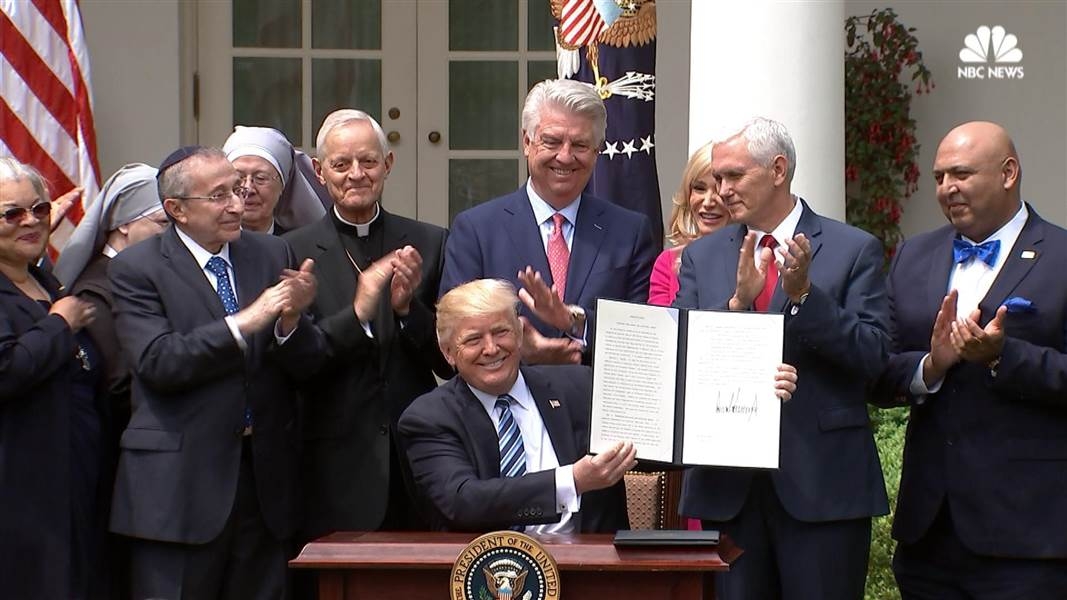The Freedom From Religion Foundation filed suit in May, 2017, challenging President Trump’s “religious liberty” executive order as it pertains to church politicking. FFRF and its co-presidents, Dan Barker and Annie Laurie Gaylor, are plaintiffs. The suit named as defendants President Trump and John Koskinen, commissioner of the Internal Revenue Service.
The order, and Trump’s repeated statements, communicated to churches that they could endorse political candidates from the pulpit, the suit contended. Trump signed the executive order with great fanfare during a National Day of Prayer ceremony in the Rose Garden, before a largely clerical audience. Trump said:
“This executive order directs the IRS not to unfairly target churches and religious organizations for political speech. No one should be censoring sermons or targeting pastors. [Standing ovation.] . . . In America we do not fear people speaking freely from the pulpit, we embrace it.”
Trump also told churches that, due to his order, they would not lose their tax exemption for violating the rule against church politicking and could say whatever they wanted: “This financial threat against the faith community is over. . . . You’re now in a position where you can say what you want to say.” The state/church separation watchdog sued the IRS in 2014 for its failure to enforce the electioneering restrictions and settled the suit after the IRS agreed to begin enforcing existing law.
According to Trump, the executive order effectively provided preferential treatment to churches and was intended to alleviate obligations on churches that remained in effect for similarly situated secular nonprofits, including the plaintiffs. But according to the President’s own Justice Department, the executive order did not have the intended discriminatory effect. In fact, it had no legal effect at all. In response to plaintiffs’ lawsuit, the Office of the Attorney General admitted, “The order does not exempt religious organizations from the restrictions on political campaign activity applicable to all tax-exempt organizations.”
FFRF had asked the federal court to declare that Trump has violated the Establishment Clause and the Due Process Clause of the U.S. Constitution, and acted in excess of presidential authority under Article II of the Constitution. The Justice Department entered into court not just one but two admissions that Trump did not overturn the Johnson Amendment. Due to these admissions by the Justice Department, FFRF declared victory and voluntarily dismissed its lawsuit in December, 2017. The lawsuit, Case No. 17-CV-330, was in the courtroom of U.S. District Judge James D. Peterson, U.S. District Court, Western District of Wisconsin. FFRF is continuing to monitor legislative initiatives and other efforts meant to undermine the Johnson Amendment, the provision that ensures all nonprofits, including churches, are prohibited from electioneering.
- Press release
- Complaint
- Why did FFRF sue, when others did not?
- Defendants’ Memorandum in Support of Motion to Dismiss
- Trump administration admits Johnson Amendment still in force
- Amended Complaint for Declaratory and Injunctive Relief
- Defendants’ Memorandum In Support of Motion to Dismiss
- Defendants’ motion to Dismiss for Lack of Subject Matter
- Voluntary Dismissal



